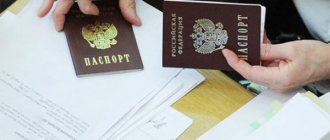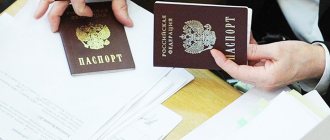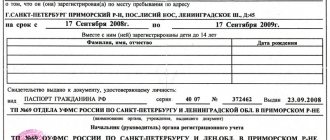What is this?
Temporary registration, which is often called temporary registration according to Soviet habit, is registration at the place of stay . This is a way for the state to track the movements of citizens. Obligation to notify appropriate authorities about their current place of residence is prescribed by law. The basis for this may be living in a new place for more than 90 days.
Important : registration of a temporary one does not deprive a citizen of his permanent registration, but only informs the state about his current location.
How to evict a temporarily registered person
There are several ways to remove a tenant from registration without his consent:
- wait for the end of his stay;
- discharge the tenant early by court decision;
- upon termination of the tenancy agreement, nothing prevents the receiving party from filing a notice of the foreigner’s departure from the place of stay.
The grounds for going to court and filing a claim for termination of the right to use and eviction are situations where temporary residents:
- do not pay for housing and communal services according to the terms of the contract;
- use the apartment for other purposes;
- absent for a long time, do not reside;
- lead an immoral lifestyle;
- violate other terms of the lease agreement.
These grounds must be supported by evidence.
It happens that a migrant does not want to leave the apartment when the registration period has expired - this is another danger for the owner of the temporary registration of foreigners in his living space. The procedure for the owner in such a situation:
- Send the tenant a written request to leave the premises. In court, this document will serve as evidence that the owner of the property has fulfilled his obligations. At least 7 days should be allowed to fulfill the requirement.
- If a citizen who has lost his registration does not respond to the demand and does not want to move out, he should contact the local police officer. The district police officer is not authorized to forcibly evict tenants, but a conversation with him can be effective, and the fact of his participation will be useful in the event of litigation.
- If the illegal tenant still does not leave, you should go to court to recognize him as having lost the right to reside in the apartment. When the court satisfies the claims, unscrupulous tenants will be forcibly evicted by bailiffs and police.
We make a decision
People who have permanent registration in the city of residence can afford it and limit themselves to it. Visitors are forced to contact the landlord with a request to obtain temporary registration. Let's weigh the pros and cons.
Behind
- Decoration gives a competitive advantage in the rental market: such an apartment will be rented faster and more willingly, perhaps even a little more expensive.
- This service will increase the loyalty of residents towards the apartment owner: having registered at their place of residence, they are likely to settle for a long time.
- Properly executed documents affect the social well-being of residents: more employment opportunities, guaranteed medical care in the district clinic, places in a school near their home. All this reduces the likelihood of leaving due to job loss, illness or domestic problems.
- If the tenants caused damage to the landlord's property, caused a flood or fire, the presence of official registration will become proof of their residence in the apartment and will help to recover damages through the court. One apartment rental agreement is often not enough for this.
Against
- If one of the residents commits a crime, law enforcement agencies will look for him at his place of registration, which will create inconvenience for the apartment owner.
- If the tenant has debts, then bailiffs will come to the apartment and inventory the property, including that belonging to the owner of the property.
- The appearance of new tenants in an apartment may attract the attention of the tax service, which will create problems for the owner if he does not submit returns and does not pay taxes. Read more about responsibility here.
- Utility bills will increase - slightly if the apartment has meters. If there are no meters and payments are calculated based on the number of residents, then the increase in rent will be significant.
Duration of temporary registration of a tenant
The law does not establish strict limits on registration periods for Russians temporarily residing in rented housing. Considering the mandatory registration of citizens if their stay is more than 90 days outside their main place of residence (any other city), the minimum registration period can be considered 91 days. The usual minimum from the position of FMS employees is three months.
Although the norms do not establish a deadline for temporary registration, civil servants performing registration usually propose limiting its duration to 5 years. Most often, the registration period is tied to the duration of the rental agreement (clause 10 of Chapter II of the “Rules for registration and removal of tenants of the Russian Federation...”).
Thus, for Russian citizens there are no time limits for temporary registration. And with the consent of the apartment owner, a tenant with Russian citizenship can apply for temporary registration independently, without the participation of the landlord.
The following norms for the period of temporary stay in populated areas of the Russian Federation apply to foreign citizens:
- 90 days for “visa-free” foreigners (i.e. citizens of countries that have a corresponding agreement with the Russian Federation) (Clause 1, Article 5 of Law No. 115-FZ “On the Legal Status of Foreign Citizens...”);
- while the visa is valid;
- while the residence permit or temporary residence permit is valid (Article 32, Chapter III, Government Resolution No. 9 “On the procedure for migration registration of foreign citizens...”).
Thus, temporary registration cannot be applied to foreign citizens for a period longer than their permitted temporary stay (residence) in Russia.
Let us emphasize: the owner of an apartment who rents it to a foreigner is obliged to personally notify the territorial office of the FMS about the arrival of the foreigner and register him.
Instructions on how to do it right
Help : registration is possible remotely, for example, through the government services website or by post.
1. Prepare the necessary documents:
- landlord's passport;
- documents on ownership of the apartment;
- rental agreement or apartment rental agreement;
- application for registration at the place of residence;
- written consent to move in from all apartment owners, notarized or certified by the employee accepting the documents;
- tenant's passport.
2. Contact the MFC or management company if it performs the functions of a passport office.
3. Receive a receipt for documents acceptance.
4. After three working days, receive a certificate of registration at the place of residence.
Temporary registration
The property rights regime allows the owner to independently determine the conditions for the entry and registration of other citizens. If registration at the place of residence provides for the emergence of a permanent right to use housing, then temporary registration is characterized by the following features:
- with temporary registration, the owner himself determines the period for which the residential premises are provided - as soon as this period expires, the registration will be canceled automatically;
- temporary registration gives rise only to the right of residence, so the owner is not threatened with loss of property or forced eviction;
- the basis for temporary registration may be a lease agreement, an application for the provision of housing for a certain period, etc.
Note!
Regardless of the status and citizenship of temporary residents, registration will be handled by units of the Ministry of Internal Affairs. However, the grounds for registration will differ significantly.
When moving in a citizen of the Russian Federation on a temporary basis, the owner only needs to submit an application to the migration department of the Ministry of Internal Affairs. The application shall indicate the following information:
- information about the copyright holder, details of title documents for real estate;
- information about temporary residents who are registered in the apartment;
- consent to temporary accommodation and registration at the place of stay;
- the period for which the registration will be issued;
- date and personal signature of the owner.
You can submit such an application not only during a personal visit to the Ministry of Internal Affairs, but also through the government services portal.
For foreign citizens, the process of temporarily moving into housing will be much more difficult. In this case, you need to take into account the rules of migration registration and movement within the territory of the Russian Federation. Foreigners can stay in Russia only on the basis of permits - tourist, work, guest and other types of visas. Only with such a document will the temporary provision of housing be recognized as legal.
In addition, when temporarily registering foreigners and stateless persons, the following legal requirements are required:
- a foreign citizen who has entered the territory of the Russian Federation is required to register with the migration department of the Ministry of Internal Affairs - this is given no more than 3 days;
- if the initiator of the foreigner’s visit was a Russian, he is obliged to provide accommodation and register the guest - the migration department must be notified of the foreigner’s arrival no later than 7 days;
- If a migrant worker or a foreign citizen with a different status moves in under an agreement, registration will be issued only for the rental period - the owner must also notify about the conclusion of such an agreement within 7 days.
Note!
If a foreigner who does not have any visa at all moves in temporarily, the provision of housing may be considered an administrative offense or a criminal offense.
Thus, when a foreigner temporarily moves in, it is necessary to immediately check the document confirming the legality of his stay in Russia. Only if you have a visa, work permit and other similar form, you can draw up a lease agreement and submit an application to the migration department of the Ministry of Internal Affairs.
What are the consequences of temporary registration for the owner? If we are talking about loss of property rights, then the owner is not in danger:
- a temporary resident registered at the place of stay acquires only a limited right of use;
- even if the tenant stops communicating or does not appear in the apartment, the registration will be canceled automatically;
- If the tenant refuses to leave the apartment after the registration is cancelled, it will not be difficult to evict him.
These rules apply to both Russian residents and visitors from foreign countries. If the foreigner has everything in order with his documents and has completed migration registration in a timely manner, he can be safely registered in the apartment with the conclusion of a lease agreement. If you notify migration authorities in a timely manner about your move-in and registration, you don’t have to worry about fines or inspections by the Ministry of Internal Affairs.
However, the owner cannot avoid certain adverse consequences if he does not comply with the law and also does not control the behavior of temporary residents. Let’s look at the consequences of temporary registration for the owner of an apartment, depending on various circumstances.
Temporary registration: what threatens the apartment owner
Although it is impossible to lose an apartment during temporary registration and move-in of citizens, the owner may face the following problems:
- untimely payment for housing and communal services can lead to the formation of debt and suspension of the supply of resources - it is almost impossible to collect such debts from a temporary tenant even through the court;
- violation of the rules for the use of residential premises and the legitimate interests of neighbors may result in fines, and in the case of the most serious offenses - forced seizure of the property and its sale at auction;
- lack of control over residents can lead to violation of the intended use of the apartment - for example, illegal trade in alcohol or drugs can result in complicity in a crime.
Note!
The list of risks also includes the obligation to pay taxes when renting out housing. However, many owners avoid such obligations, since the Federal Tax Service does not fully control the rental of real estate.
Most of the listed risks can be easily avoided if the contract is drawn up correctly, as well as ongoing monitoring of the guests’ accommodation. For example, you can check monthly the fact of payment for housing and communal services or take these expenses into account in the rent. For the first violation of the rules of residence, you can demand termination of the contract. It is better to clarify all these nuances with a professional lawyer before concluding a contract and actually moving in.
Temporary registration of a child: what the owner faces
What are the consequences for the owner of temporary registration of a child? It is generally accepted that any move of minor children into an apartment, even on a rental basis, significantly complicates the procedure for forced eviction. In fact, no serious problems will arise with the temporary registration of children. Registration at the child’s place of residence through the Ministry of Internal Affairs will also be canceled upon expiration of the period previously agreed upon with the owner.
When moving in and registering children, you need to take into account a special rule. Even after concluding a lease agreement and providing living space to one citizen, you cannot prohibit him from moving in and temporarily registering members of his family - his spouse and children. Therefore, in fact, instead of one tenant, you can get a large family with small children. This does not pose a threat to property rights, and the only significant drawback will be the increased consumption of utilities.
Temporary registration of foreign citizens: what threatens the owner of the apartment
The most serious consequences may occur when foreigners move in and register. Depending on the situation, the following penalties may apply:
- for fictitious registration of a foreigner at the place of stay, a penalty will be imposed;
- administrative liability arises if you fail to timely notify the migration service of the Ministry of Internal Affairs about the fact of concluding a lease agreement and registering a foreigner;
- according to the Code of Administrative Offenses of the Russian Federation, it will be punishable to miss deadlines for providing housing to a foreigner invited to Russia by the owner of the apartment;
- a separate punishment will follow for untimely extension of temporary registration.
Note!
You should not expect any threats to the ownership of an apartment from temporary residents. The law guarantees that registration at the place of residence will not entail the loss of property rights.
Criminal liability for fictitious registration of foreigners was introduced in 2013. Signs of fictitiousness will be the submission of knowingly false information or documents to the Ministry of Internal Affairs or the provision of registration without the intention of actual occupancy. Most often, owners who allow mass registration of foreigners without visas are punished under this article. If a violation is proven, the owner may receive a criminal record with a fine (from 100 to 500 thousand rubles) or imprisonment for a term of 3 years.
The size of administrative fines will also negate all income from renting out the apartment. For example, for violating the terms of renewal of registration, the sanction will range from 2 to 7 thousand rubles. For violation of the procedure for notifying migration authorities about the temporary provision of housing to foreigners, the fine will be up to 4 thousand rubles. For foreign citizens themselves, such a violation will entail forced departure outside the Russian Federation.
Is it easy to cancel later?
Temporary registration terminates automatically upon expiration of the period and does not require additional actions from either the tenant or the apartment owner.
To terminate it ahead of schedule, the owner of the residential premises must personally or through the government services website submit an application for the tenant’s departure.
The deregistration period will be 3 working days.
Who can demand an extension and create problems?
The law allows the deadline to be extended for the following categories of citizens:
- pregnant women;
- disabled people;
- minors.
The nuance is that an employer with temporary registration can independently register his own minor children. If a parent's registration has expired and the child is still enrolled, the parent has the right to re-register. However, the owner can legally evict both the tenant and his children with the official termination of registration.
Advice : temporary registration should be issued for the shortest possible period, extending as necessary.
Consequences of ignoring the established norms of temporary registration
The obligation of the landlord who has provided an apartment for accommodation to a foreigner is to notify the migration registration authorities that the foreign tenant has arrived (Clause 3 of Article 20 of Law No. 109-FZ).
The liability of individual landlords for failure to provide information in a timely manner, as noted above, is 2-5 thousand rubles. This fine is applied in the absence of signs of a criminal act.
The legislation specifies a separate punishment for fictitious registration in residential real estate of both a citizen of the Russian Federation and a foreigner - a fine of 100-500 thousand rubles. or the amount of three years’ income of the convicted person (Article 322.2 of the Criminal Code of the Russian Federation). A fictitious registration is one declared to the FMS based on false information, or its registration without the actual residence of the resident at the temporary registration address (Article 322.3 of the Criminal Code of the Russian Federation).
Difficulties in eviction
Temporary registration is not the official place of residence of a person, it is just registration at the place of actual residence, which automatically terminates upon expiration of the period prescribed by the migration service. Therefore, the owner of the property should not have any difficulties with eviction.
If the period has expired, and persons registered on a non-permanent basis are not evicted, the owner has every right to resolve the issue by applying to the courts of general jurisdiction at the location of the disputed property. If the court finds that the period has indeed expired and the tenants are occupying the premises illegally, forced eviction will be applied to them.
Temporarily registered minors and incompetent persons are evicted on the same grounds.
Pitfalls when registering children
The current legislation of the Russian Federation obliges children to be registered at the place of registration of their parents, regardless of the permission of the owner of the residential premises. Therefore, temporary registration of minors can have negative consequences for the homeowner.
A citizen can register his child for a time exceeding the period of his registration, which is quite likely to happen both due to the lack of regulations governing the standards for registering children, and due to the inattention of migration service employees. As a result of such an error, the parent can, through the courts, re-register at the address where the child is registered. Selling, donating, or re-registering in some other way an apartment in which children are registered is very problematic, especially if it is rented for a long period without carefully spelled out conditions for early cancellation of the contract.
If the parents do not have another registration, it will be problematic to register them and the child in the future. At the first consideration of the case, the court may refuse to discharge, citing the fact that in this case the child will remain on the street.
To avoid such a situation, before the registration procedure it is necessary to find out about the existence of minor family members of the person being registered. If registered residents have a child, it is advisable for the apartment owner to be personally present at the migration service office in order to be able to track the dates of registration of the children and their parents.
Rent amount
An increase in the amount of utility bills during temporary registration is determined only by the presence of individual water, gas and electricity meters. If there are no meters, then the calculation is made in accordance with the standards, which are multiplied by the number of residents registered in a given residential area.
The following categories are not tied to the number of people living in the apartment:
- payment for heat energy;
- housing maintenance;
- waste removal and disposal.
The cost of these services is calculated from the total area of the housing. If the apartment is equipped with metering devices, then the increase in rent will depend only on the meter readings.
To avoid misunderstandings, payment issues must be discussed with residents in advance, since temporary registration and utility payments are directly related to each other.
Rules for the temporary stay of IS in the Russian Federation
According to the above-mentioned laws, the terms and characteristics of a foreigner’s stay on the territory of Russia are strictly regulated:
begin the procedure for obtaining temporary registration no later than 7 working days after arrival in the Russian Federation. This applies only to foreigners - for non-resident citizens of the Russian Federation the period is 3 months.- Registration is carried out on the basis of a migration form, which foreigners fill out when crossing the border of the Russian Federation. If for some reason there is no such sheet, then you need to request it from the FMS.
- When the period of registration expires, a person must either leave the territory of the Russian Federation or renew his registration using the appropriate documents.
The stay of CIS citizens in Russia has some peculiarities, but in general the rules remain unchanged. The only difference is the period during which a person can live permanently in the Russian Federation without registration.
If for a foreigner from outside the CIS it is always 7 days , then for citizens of Belarus, Armenia and Kazakhstan – 30 days; Tajikistan – 15 days; Ukraine – 90 days.
The total stay in the Russian Federation should not exceed 180 days per year.
Methods of transmitting information about the arrival of a foreigner
The main way to convey information that a foreigner will soon arrive in the Russian Federation is a migration registration notification form.
The receiving party most often fills out such a form, which indicates specific information about the foreign citizen, the date of his arrival and expected departure. This information is transmitted to the FMS.
There are two ways to submit the form:
- take it to the FMS office;
- send by Russian Post.
CIS citizens, when crossing the border with the Russian Federation, usually fill out the migration form themselves, which is offered to them on the train or plane . Otherwise, there are no differences between foreigners and CIS citizens.









